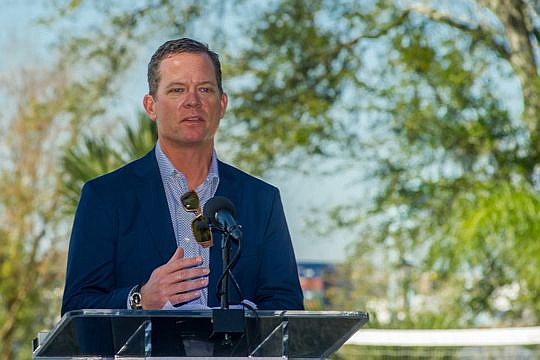
Chris Fischer was first pointed to Jacksonville in January 2013 by a girl named Mary Lee, whom he met that previous fall.
Fischer’s Ocearch team had tagged the shark four months earlier off Cape Cod, Mass., and tracked her as she headed south to Florida.
“She knew before we did,” he said Thursday, as he talked about Ocearch’s new partnership with Jacksonville University. “She’s like, ‘I’m trying to show you the way, man.”
The university is now home to what Fischer described as “the largest shark collaborative in the world.”
Ocearch studies marine sciences and shares its data, partly to engage students and inspire future generations. It will collaborate with JU’s Marine Science Research Institute and offer opportunities from students across the campus.
RELATED STORY: Jacksonville University partnering with Ocearch, whose founder is 'modern Jacques Cousteau'
As he was welcomed to the university on Thursday, Fischer talked about another Mary Lee who helped lead him to Jacksonville.
His mother, after whom he named the shark, and his father, George, raised him and his siblings to believe anything was possible.
“When people oftentimes said things were impossible, all that did was provide us a vista from which to see further than we could before so we would continue to reach,” he said.
Growing up in Louisville, Ky., Fischer first fell in love with the water through recreational fishing.
Each year, his parents took the family to Florida for vacation, which fostered Fischer’s passion for the ocean.
As a young man, he was inspired by Jacques Cousteau, the famed researcher who helped people understand how important the ocean was for the future.
“When we lost Cousteau, the ocean lost a great, great asset,” Fischer said.
He studied entrepreneurship at Indiana University and began his own work in the water about 20 years ago.
Fischer ultimately realized, “You can’t change the future of the ocean on a fisherman’s story. You need a peer-reviewed public paper in the academic space and academic partners.”
But for some reason, the two communities hadn’t come together, he said, “on a grandchildren-first, planet-first, ocean-first selfless vision.”
Ocearch began to focus on trying to build an enterprise that could bring together the practical and the academic, he said, “to drive data sets required to move the system toward abundance.”
And he openly shared those data sets with others.
In the era of connectivity, the question became whether Ocearch could build a social enterprise that would make it worthwhile for companies and institutions to fund the exploration and science required.
As the team built Ocearch and began to prove the model could work, Fischer consistently heard a question from students: How do we get involved with Ocearch?
“You know what, I have an answer for them now: Go to Jacksonville University,” he said.
Ocearch will still collaborate with institutions and science programs around the world like it has been.
“Nothing will change in our core values,” Fischer said. “One of the key reasons we’re here (at JU) is we have shared values — ocean first, grandchildren first, planet first.”
Fischer said the partnership with JU allows that effort to continue in perpetuity.
He’s excited to move Ocearch to Florida where his passion for the ocean began.
“We all understand the hunter saved the forest,” he said. “Why would we expect anyone other than the recreational fisherman to create the future of the ocean?”
Fischer’s welcome Thursday was much more than a typical news conference, evidence of how significant the university views the partnership.
There were several speakers and an audience, which rose to its feet when JU President Tim Cost introduced him.
Cost called Fisher “one of the most entrepreneurial aggressively innovative visionary individuals who is highly disruptive to everything we do and we should celebrate that.”
The president said the two came to the partnership from different places and in different ways.
“One of us corporate, one of us completely entrepreneurial, with a true academic leader in the middle,” Cost said, referring to Quinton White, founding executive director of the institute.
@editormarilyn
(904) 356-2466